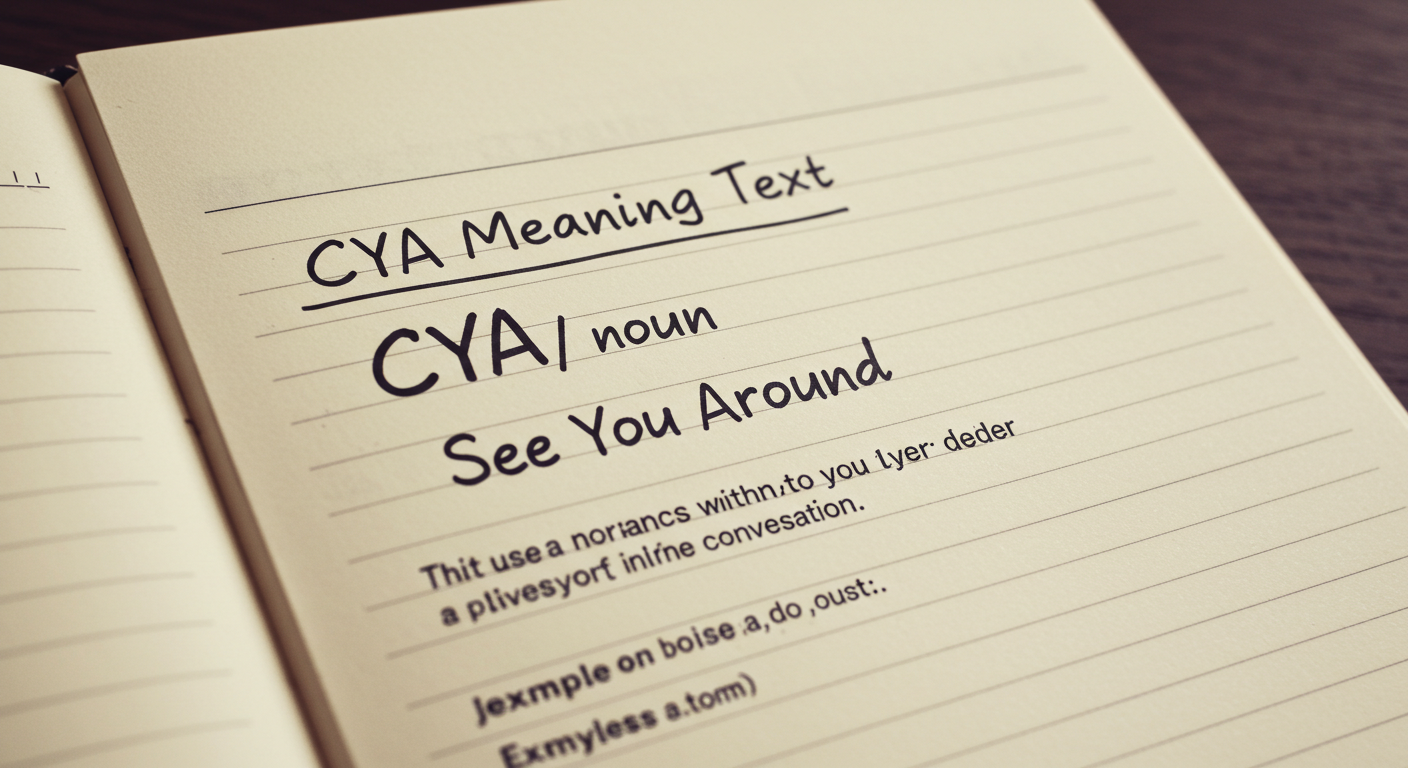When you first stumble across the abbreviation CYA while scrolling through texts, tweets, or even work emails, you might squint at your screen like,
“Wait, what’s that mean again?” It’s one of those slang terms that’s been kicking around for decades, with meanings that bounce from casual “See You Around” to the more cautious “Cover Your Ass” — and boy, the difference between those two couldn’t be more night and day.
Like many slang acronyms born from the 1990s–2000s internet boom and workplace jargon, CYA carries a colorful history and a diverse set of uses in the world of texting, social media, and even professional chats.
So, if you ever wondered what people really mean when they drop CYA in their messages, or if you’ve ever been caught off-guard by its ambiguous tone, you’re in the right place.
This guide breaks down everything you need to know about this quirky slang acronym — its origins, various meanings, where it’s appropriate, and where it’s better left unsaid. Let’s dive in, shall we?
The Origins of CYA: From Military to Corporate Jargon
Believe it or not, CYA didn’t originate as some goofy internet thing. The phrase “Cover Your Ass” first surfaced in military slang, a blunt way soldiers would warn each other to be cautious, document everything, and avoid blame in case things went south. Imagine a squad leader saying, “Make sure you file those reports, soldier. Always CYA.”
Fast forward a few decades, and this no-nonsense caution turned into a staple of corporate slang, especially in the US, UK, Australia, and Canada workplaces.
The phrase evolved from strict military lingo into a way to highlight the importance of documentation and protecting oneself from potential blame or accountability in meetings, emails, and project handovers.
At the same time, the phrase “See You Around” — a more laid-back, casual goodbye phrase — was abbreviated as CYA in informal texting and internet chatrooms, especially during the early days of online communication in the late ‘90s and early 2000s. So, two very different worlds share the same acronym!
CYA in Texting and Social Media: Casual Conversations and More
Nowadays, the meaning of CYA depends heavily on the tone, context, and who you’re chatting with. Here are the main ways people use it in the wild:
- See You Around
This is the chill, friendly, casual use of CYA. You might see this in messages between friends wrapping up a conversation, or in social media posts when someone signs off with a lighthearted “CYA later!” It’s a quick way to say goodbye without the formality of “talk soon” or “bye.” - Cover Your Ass
This usage tends to pop up in professional settings like workplaces or during professional chats, sometimes disguised as a reminder to keep things documented or to be cautious. It’s a phrase that’s half-serious, half-joking, often used when someone wants to highlight that they’re making sure they aren’t going to get blamed for something if it goes wrong. For example, “I cc’d the manager on that email to CYA.”
Gaming and Online Communities
In the realm of gaming, CYA might get thrown around casually, often meaning “See You Around” after a match or online session.
But it can also subtly imply a kind of wariness or tactical play — like when players remind each other to cover their backs or avoid blame.
Online dating apps and internet chatrooms also pick up on both meanings. A quick “CYA” might just be a light, breezy way to end a convo, or a subtle sign someone’s stepping away carefully from the interaction.
How to Use CYA Appropriately: Context is King
Let’s be honest — slang acronyms like CYA can be a minefield. Use it wrong, and you risk sounding rude, unprofessional, or confusing your reader entirely. Here’s a quick rundown of how to wield CYA wisely:
- Use “See You Around” in casual texts and social media. It’s a friendly, informal sign-off that fits best with friends, acquaintances, or online communities where tone is easy to gauge.
- Use “Cover Your Ass” carefully in professional environments. It can work as a humorous nudge among colleagues who understand the lingo, but avoid it in formal emails or with clients, as it can sound unprofessional or abrasive.
- Avoid CYA in sensitive or official communications. If you’re unsure whether the recipient will interpret it correctly, err on the side of clarity. Use phrases like “I’m documenting this for reference” or “Just to be clear” instead.
- Consider regional and cultural differences. In the US, the phrase “Cover Your Ass” is well-known but might be softer or less commonly used in places like the UK or Australia. Always tailor your slang to your audience.
When CYA Can Be Misunderstood or Misused
Language is tricky, especially in digital spaces where tone is invisible. Because CYA has two very different meanings, confusion is common.
Imagine sending a message saying “CYA at the meeting” does that mean you’re literally saying goodbye or warning someone to be careful and document their work? Without context, it’s a gamble.
Also, using CYA with people unfamiliar with slang can backfire, especially in formal or cross-cultural communication. The phrase “Cover Your Ass” can come off as rude or disrespectful if not delivered with the right tone or audience.
Other Popular Slang Acronyms You Might See Alongside CYA
If you’re decoding CYA, you might also bump into these frequently used slang acronyms, especially in texting and social media:
- OPT Meaning in Text (Often means “Optional” but varies by context)
- MIA Meaning in Text (Usually “Missing In Action,” referring to someone who’s absent)
- TTYL (Talk To You Later)
- BRB (Be Right Back)
- FYI (For Your Information)
These acronyms similarly rely on context and tone, making them handy shortcuts in digital communication.
Real-Life Stories and Cultural Notes on Using CYA
One of my friends, a project manager in a big Toronto tech company, once told me how CYA was their unofficial motto during stressful launches.
“It’s like, you gotta cover your ass or someone will come knocking when the bugs show up,” she laughed.
She explained how her team used it as a playful reminder to keep documentation tight but always made sure new hires understood it wasn’t about blaming but about accountability.
On the flip side, I’ve chatted with gamers from the UK who swear by CYA as a casual farewell after an online match, and it’s always a light moment — no stress, just a quick “See You Around” before the next game.
How to Write Your Own Custom CYA Messages
If you’re thinking about dropping CYA in your messages but want to add a personal touch, here are a few tips:
- Match the tone: Are you saying goodbye casually or warning someone to be careful? Make sure your words around CYA support the meaning.
- Add context: Instead of just “CYA,” try “CYA at the meeting tomorrow! Don’t forget to save your files.” Or, “Thanks for the chat, CYA soon!”
- Know your audience: Use CYA more freely with friends or colleagues who get the slang, but avoid it in formal emails or with people unfamiliar with the term.
- Combine with other phrases: Mix CYA with other slang or friendly words for a more natural vibe. For example, “Alright, I’m off—CYA! Don’t be a stranger.”
Wrapping It Up
The beauty of CYA lies in its versatility—whether it’s a breezy goodbye phrase or a sly reminder to protect yourself in tricky situations, it captures something fundamentally human about communication: the balance of warmth and caution, casualness and professionalism.
Next time you see CYA pop up in a text or chat, you’ll know exactly what’s under the surface. And maybe, just maybe, you’ll even feel a little cooler dropping it yourself — in just the right way, at just the right time.
So, CYA soon, and hey, don’t forget to share your own stories or favorite slang acronyms in the comments. After all, language is a living thing, and we’re all just here trying to make sense of it, one message at a time.
Frequently Asked Questions
Is CYA rude to say?
It depends! If you mean “Cover Your Ass,” it can sound blunt or rude if used improperly. The casual “See You Around” version is usually friendly.
Can I use CYA in professional emails?
Generally no. It’s better suited to informal chats among colleagues you know well.
What’s the difference between CYA and TTYL?
CYA means “See You Around,” a more casual goodbye, or “Cover Your Ass,” a cautionary phrase. TTYL means “Talk To You Later” and is a more specific promise to continue chatting.
Are there cultural differences in using CYA?
The phrase “Cover Your Ass” is more common in the US, while casual “See You Around” might be understood differently elsewhere.
what does cya mean
CYA is an abbreviation that can mean “See You Around” or “Cover Your Ass,” depending on the context.
what does cya mean in text
In text, CYA usually means “See You Around” as a casual way to say goodbye.
what does cya mean in texting
When texting, CYA commonly stands for “See You Around,” but sometimes it means “Cover Your Ass” to warn or protect yourself.
what is cya mean
CYA means either “See You Around” (casual goodbye) or “Cover Your Ass” (protect yourself from blame).
what does cya mean on text
On text, CYA often means “See You Around,” but in work or serious chats, it might mean “Cover Your Ass.”











